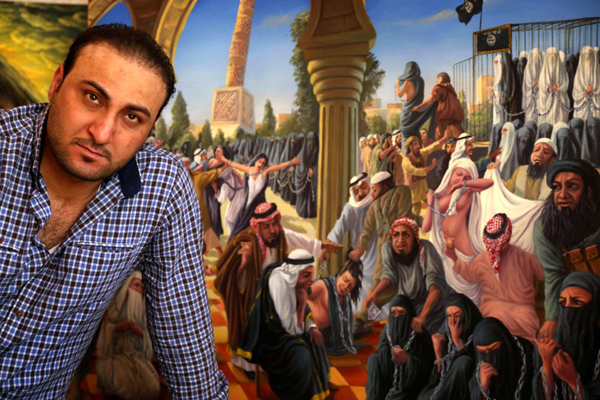Iraqi artist puts trauma onto canvas
Updated: 2015-04-15 07:13
(Agencies)
|
|||||||||||
 |
|
Iraqi painter Ammar Salim poses near one of his art pieces at his workshop in the Iraqi Kurdish city of Dohuk, on March 26. [Photo/Agencies] |
A jihadist fighter slits a man's throat. Another brandishes a severed head, spiked on his rifle, as more militants dump bodies into a trench overflowing with corpses.
This is how painter Ammar Salim depicts the atrocities Islamic State extremists perpetrated against his minority group-the Yazidis-in northern Iraq last summer.
In his tiny apartment in Dohuk, in Iraq's Kurdish region, Salim has attempted to put the collective memories of his community on canvas in a series entitled The Yazidi Genocide.
This particular piece, his most recent, includes more than 100 characters and was inspired by mass graves found in the Sinjar area.
"Most people fight through weapons, writing or the press. I said I'd fight through art," Salim says. "I want people to see what they haven't seen."
The paintings, including many crowded and colorful scenes reminiscent of Renaissance depictions of Hades, are intentionally shocking.
One work depicting the fall of Sinjar shows women being raped, killed and carried away. Another presents cackling jihadists buying and selling Yazidi women in the city of Mosul, their main hub in northern Iraq.
Salim fled the town of Bashiqa when IS fighters took over Mosul in June in an onslaught that overran large areas of Iraq. During a second offensive in August, the jihadists targeted areas in the north that were home to many Iraqi minorities.
The Yazidis, who are neither Muslims nor Arabs, and who practice a unique faith that makes them infidels in the eyes of the jihadists, were hit harder than others.
They appeared to be in danger of being wiped out of their ancestral land until a US-led air campaign turned the tide on IS advances.
"When you have a stable life you can give beauty," Salim says. "When you are in such a miserable life, you have to talk about what's inside you."
The culmination of this trauma has led not only to Salim's portrayals of IS militants but also to other, more fanciful, manifestations of suffering.
In one painting, which he describes as "a forest of hell", he depicts a road leading to the Yazidi holy site of Lalish. The trees lining the road, linked by chains, are shaped like women crying out to the heavens.
The background is a blood-red sunset mixed with burned oranges and yellows.
Asked if the pain and suffering in his paintings has become a key part of Yazidi life, Salim says: "It has become all of our life."
The series so far consists of seven paintings, but Salim hopes it will eventually grow to include 20 pieces.
Related Stories
6,000 Europeans fight with jihadist groups 2015-04-14 08:04
Search goes on for jihadist cell leader 2015-01-20 07:56
Kerry visits Iraq to build support for anti-jihadist campaign 2014-09-11 07:12
IS gunmen attack S. Korea's embassy in Libya, killing 2 2015-04-12 16:33
IS attack kills 44 in central Syria 2015-04-01 09:17
'I am responsible,' says father of Australian jihadist bomber 2015-03-24 08:01
Today's Top News
Holocaust memories to live on
Problem-plagued Milan Expo battles a long list of headaches
Foreign ministers call for end to fighting in east Ukraine
Spotlight set to shine on royal sibling
Stronger yuan boosts tourism
Exhibition recalls zoo wardens who hid dozens of Jews
Germanwings flight canceled after bomb threat
Failed developer shoots dead 3, injuries 2 in Milan
Hot Topics
Lunar probe , China growth forecasts, Emission rules get tougher, China seen through 'colored lens', International board,
Editor's Picks

|

|

|

|

|

|






